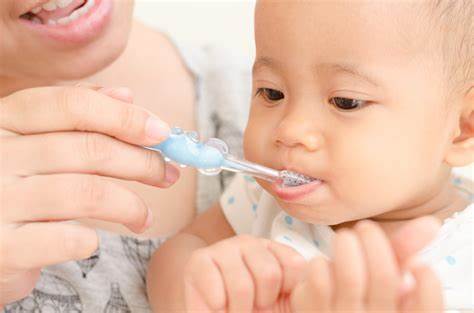
Hello, wonderful parents! 👶💕
Navigating the journey of teething and establishing good oral care for your little one can feel overwhelming. But with a bit of knowledge and a lot of love, you can ensure your baby’s smile stays bright and healthy. Let’s explore this together!
Understanding Teething
Teething is a natural part of your baby’s development, typically beginning around 4 to 7 months of age. During this time, those adorable first teeth start making their debut, which can bring about some discomfort for your little one.
Common Signs of Teething
Your baby might exhibit:
- Increased Drooling: You might notice more drool than usual.
- Gum Swelling and Tenderness: Their gums may appear swollen or tender.
- Chewing on Objects: A newfound interest in gnawing on toys or fingers.
- Irritability or Fussiness: They might be a bit more irritable due to discomfort.
- Slight Increase in Temperature: A mild rise in temperature is possible, but a high fever is not typical.
Note: If your baby has a high fever, diarrhea, or a rash, it’s best to consult your pediatrician, as these are not common teething symptoms.
Soothing Teething Discomfort
Here are some gentle ways to ease your baby’s teething discomfort:
- Gum Massage: With clean hands, gently rub your baby’s gums using a clean finger or wet gauze. The pressure can provide relief. mayoclinic.org
- Teething Rings: Offer a firm rubber teething ring. Avoid those filled with liquid or that can break easily. fda.gov
- Cold Compress: A cold spoon or chilled (not frozen) teething ring can be soothing. Always supervise your baby during use.
- Comfort and Cuddles: Sometimes, extra love and attention are the best remedies.
Establishing Good Oral Care Habits
Starting early with oral care sets the foundation for a lifetime of healthy smiles:
- Before Teeth Erupt: Gently wipe your baby’s gums with a soft, clean cloth twice a day—after feedings and before bedtime. This helps remove bacteria and sugars that can harm emerging teeth. cdc.gov
- After Teeth Erupt: Once that first tooth appears, begin brushing twice daily using a soft-bristled, small-headed toothbrush with plain water. cdc.gov
- Avoid Bedtime Bottles: Putting your baby to bed with a bottle can lead to tooth decay. Instead, ensure they finish their feeding before bedtime. health.ny.gov
- First Dental Visit: Schedule your baby’s first dental appointment by their first birthday. Early visits help in monitoring dental development and addressing any concerns promptly. cdc.gov
A Note on Teething Medications
The FDA advises against using over-the-counter teething gels or tablets, especially those containing benzocaine, due to potential health risks. Always consult with your pediatrician before introducing any medications.
Remember, every baby is unique. What works for one might not work for another. Trust your instincts, and don’t hesitate to reach out to healthcare professionals with any concerns. You’re doing an amazing job, and with your care, your baby’s smile will continue to shine brightly.
Video Resrouces:
English
Spanish
Legal Disclaimer: The information provided by our nonprofit is for informational purposes only and not a substitute for professional medical advice, diagnosis, or treatment. Always consult a qualified healthcare provider for medical concerns. We make no guarantees about the accuracy or completeness of the information and are not liable for any decisions made based on it. If you have a medical emergency, call 911 or seek immediate medical care.


